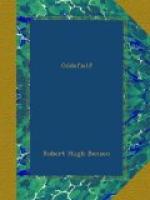Looking back upon the matter as I write, it is hard for me to understand why I did not see through his design, since I saw so much of it. Yet it was not until London was in sight, or rather its lights against the sky, that all fell into its place; and I wondered at the simplicity of it. I think that it was the way he talked to me—the manner in which he skirted continually on the fringe of treason, yet said nothing that I could lay hold upon, and, above all, mentioned no names—that gave me the clue. I fear I fell a little silent as I perceived how point after point ratified the conclusion to which I had come; but I do not think he noticed it; and, even if he did, it would only encourage him the more. And when I saw the whole, as plain as a map, my scruples left me altogether. I would not have betrayed the true confidence of this man, or of any other; that resolution still held firm; but this was another matter altogether.
By the time that we reached Covent Garden—for he rode with me as far as that—I think he was satisfied that he had caught me in the way that he wished; for he had given me the names of one or two places where I could communicate with him if I desired; and was nearer actual treason in his talk than ever before—though he did not go much beyond deploring the Popish succession, and feigning that he did not know that I was a Catholic; and, on my side, I had feigned to be greatly interested in all that he had said, and had let him see, though not too evidently, that it was feigning on my side too. We parted, outwardly, the best of friends; inwardly we were at one another’s throats.
So soon as I had dismounted—he having left me in the Strand—and gone indoors, I came out again, not fearing, indeed rather hoping, that he would be watching for me, and, in my boots just as I was, set out for Whitehall.
* * * * *
Mr. Chiffinch was within, expecting me. Even he looked a little excited; and no wonder. But first I made him answer my questions before I would say a word beyond telling him that his design had prospered.
“Mr. Chiffinch,” said I over my supper which he had brought for me to his parlour. “Before I say one more word, you must tell me three or four things. The first is this. How did you know that it was in me that my Lord Essex would confide?”
“That is easily answered,” said he. “My men told me that my Lord was after you everywhere—both in your lodgings and here.”
“Ah!” I said, “and was there a fellow called Rumbald, with him?”
“You are right,” he said. “How did you know that?”
“Wait,” I said. “The next is, If you could tell me so much in your letter, why did you not tell me the names of the persons?”
He smiled.
“Mr. Mallock,” he said, “from your hesitation I knew that you would refuse to do such work as this. So I intended to catch you unawares, and to entangle you in it. I knew that you would not refuse to go to Amwell, and behave there as I directed, if I said no more than I did.”




